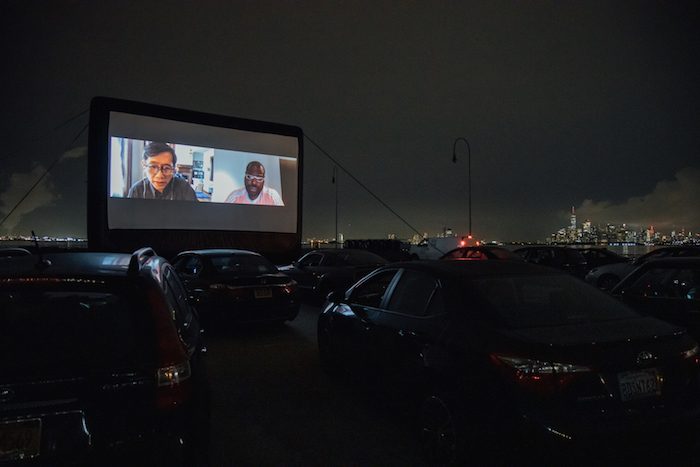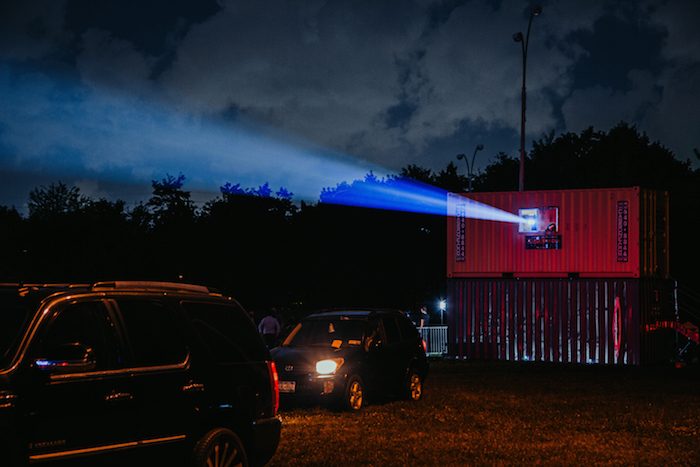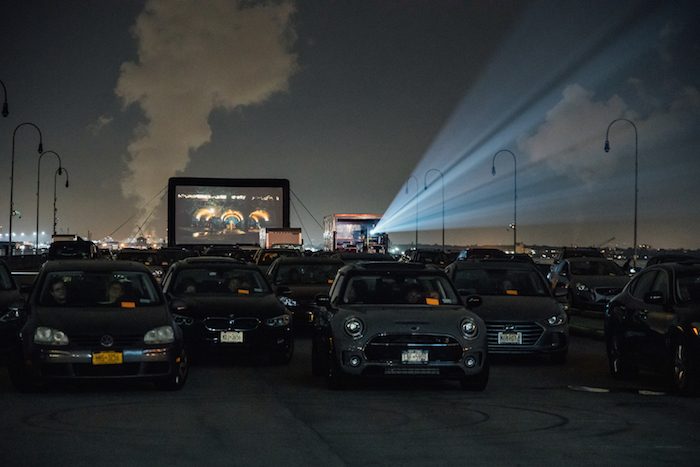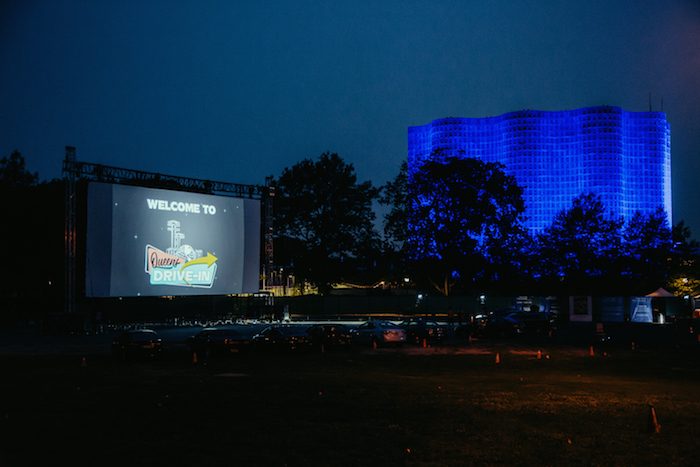The Inside Story Of How NYFF 2020 Became America's First Big Pandemic-Era Film Festival
For many, the fall conjures up images of pumpkin spice lattes, flannel shirts, or the return of football. For me, the one constant of the season in recent memory has been the New York Film Festival, which I've attended in some form since my final year of college in 2014. As the leaves change and the seasonal weather turns, the best of world cinema has beckoned film lovers indoors to the cinemas at Lincoln Center to stare in wonder at a screen inside a dark room.
Despite fears that the pandemic would break the streak, this year marks my seventh consecutive New York Film Festival – albeit one unlike any other before it. I'll still be enjoying NYFF from the great indoors, though in 2020, that enclosed space will be my own apartment. This year, the fest is taking their programming digital (and nationwide, to boot) while also hosting select drive-in screenings across three boroughs of New York City. It's as unconventional as it is improbable, a testament to how artistic institutions have seized this unprecedented moment as an opportunity for experimentation and reimagination.
But being America's first major pandemic-era film festival was never assured. As festival director Eugene Hernandez told me, none of it was ever a guarantee. But NYFF beat the odds in the nation's first hotspot, no less, and is currently underway online and across the city. How did the Film at Lincoln Center team pull it off? Hernandez walked me through the festival's evolution and rebirth, which began even before the coronavirus wreaked havoc on the Big Apple.

Sean DiSerio
The Before Times
NYFF was due for a change regardless in 2020, although certainly not one of this magnitude. Just a week prior to last year's edition, festival director and selection committee chair Kent Jones announced he was stepping down. After seven years overseeing the festival, Jones chose to pursue his own filmmaking career and left NYFF ripe for the remaking once again. (As I suggested after 2019, perhaps not in entirely unwelcome ways.)
Film at Lincoln Center looked inwards to fill Jones' shoes, elevating two stalwarts of the organization in February 2020: Dennis Lim to the festival's director of programming role and Eugene Hernandez to festival director. Hernandez said he and Lim wanted to lean into the organization's decision to hire from within and looked first to the input of their leadership and staff. Their key finding? People wanted the festival to be shorter.
"Because it's a grueling experience," Hernandez expanded, "it wasn't said as a joke, it was in all seriousness." Though NYFF represents one of the more manageable slates among premiere tier festivals, its 17-day duration can make for a long slog nonetheless. The festival came to take on such an extensive duration, Hernandez explained, largely in response to Lincoln Center adding specialized film venues like the Walter Reade Theater and Elinor Bunin Monroe Film Center over the past few decades. But the key takeaway from those early conversations was that the contours of their festival grounds should not be the primary determinant of the festival's programming slate – a concept that, little did Hernandez know, would prove of immeasurable value in the months to come.
Another early initiative in Hernandez and Lim's tenure involved engaging the Gothamite film community outside their home turf. This was not intended as a new venture for NYFF so much as it was a return to a former festival initiative. "After the New York Film Festival was created in the early '60s," Hernandez detailed, "the next program that the organization created was Movies in the Parks. It was driving three projectors around to parks in New York City to show movies." Reconnecting with that spirit feels very in line with the organization's guiding ethos, especially after a 2019 rebrand moving away from the somewhat clubby exclusivity communicated by their former name "Film Society of Lincoln Center."
"How can we reclaim that spirit and that mission of bringing movies to all parts of the city for audiences all around the city?" Hernadez asked. In early March, he re-engaged with Dan Nuxoll, the founder of New York's Rooftop Films, a cultural institution that helps to fund independent films and exhibit them in pop-up outdoor venues across the city. The two men knew each other from New York's startup scene in the '90s and met in March 2020 to begin discussing how their two organizations might collaborate to grow their reach.
Little did Hernandez know, this was to be the last meeting he would conduct in-person for the foreseeable future – as well as one of the most consequential for the survival of his first edition at the New York Film Festival's helm.

Dan Rodriguez
Yas (Mc)Queen
Moviegoing as New Yorkers knew it ground to a screeching halt on March 12 as Film at Lincoln Center shuttered its two movie theaters. These serve as key festival venues and have still yet to reopen over six months later in response to orders from Governor Andrew Cuomo. "In our worst-case scenarios," Hernandez admitted, "I think we all thought that movie theaters would be open again by September."
But as the months dragged on and full containment of COVID-19 continued to elude the United States, the film festival calendar was upended. SXSW and Tribeca, both of which had already announced their lineups prior to the country entering extensive lockdowns, canceled their 2020 editions and made a few titles available for press to review. Cannes and Telluride tried valiantly to save their exclusive physical gatherings, but each opted to cancel. (They did release their official selections, however, so those films could tout the festival laurels in their marketing.)
The country had bigger problems than the survival of film festivals at this point, to be clear. Yet if an extended period of time passed with none of these events taking place, the result would be a content backlog in the art-house and independent cinema world. Forget the annoyance of delayed delivery for audiences – the disappearance of the festival circuit would hamper the discovery and emergence of new voices.
Hernandez admitted that conversations in those early spring months, when the virus hammered New York City, centered around whether or not it made sense to even put dates on the calendar for NYFF. With no playbook for how to navigate a pandemic other than Steven Soderbergh's Contagion, he remarked, "We absolutely had serious conversations about whether it made sense to carry on this year." By early May, Film at Lincoln Center made its first big announcement about the new format of the festival: streamlining the unwieldiness of the structure as well as expanding and diversifying the curatorial team.
The organization planted a flag in the calendar but little else; the statement mentions that NYFF was "exploring a combination of both in-person and digital experiences, as circumstances allow." At this point, the staff had expressed support for teaming up with Rooftop Films, yet the partnership was not official. Nor had the organization built out its own digital screening platform – its new releases in a "virtual cinema" operated in a patchwork arrangement with various distributors.
The real turning point that catalyzed the 2020 New York Film Festival, according to Hernandez, came in early June as the uprising for racial justice swept America. The festival had already engaged several filmmakers planning to unveil new work in the fall, virus be damned, but Hernandez credits the call Steve McQueen placed to Dennis Lim as the one that changed everything. The Oscar-winning filmmaker reached out to say in the week following the murder of George Floyd, "I've got these films. It's gonna be five films total, but I think three could be ready in time for you for the festival. Can we show them to you? I'm dedicating them to George Floyd. I can't imagine a better place than New York City at this moment to premiere them. But I want you take a look and see what you think."
Hernandez described the call as a crucial vote of confidence in the festival's need to persist in some form or fashion during this turbulent year. "More than that," he expounded, "it was also a statement about the opportunities that lay in front of us, not only bringing films to the world this year [but also to] bring films to our audience in New York this year." As they would later announce, the festival accepted all three films from McQueen's Small Axe anthology and programmed one of them, Lovers Rock, as the Opening Night selection.
They had their charge. Now, they had to build a new festival framework that would allow them to fulfill their mission "to share cinema with an audience and explore and celebrate the art and craft of cinema," as Hernandez stated.

Sean DiSerio
The First New York Film Festival
As the summer arrived in earnest, the time came for Hernandez and the Film at Lincoln Center team to think about the event not in generality but in practicality. "It's a 58-year-old festival," he observed, "But, in many ways, this is the first year of the New York Film Festival." Everything from budgeting to ticketing to engaging audiences required them to redesign their entire approach to staging the event.
Though New York had begun to flatten the curve by the end of spring, Hernandez knew safety remained a paramount concern in their planning. "It's really important to emphasize, we obviously weren't gonna do anything reckless, we're not gonna do anything illegal," he underlined. "We have to do what's safe and comfortable for our audience." Everything would take place with concern for health first and foremost, with cooperation and approval from state and local authorities.
To preserve some semblance of a collective cinema experience, NYFF leaned on Rooftop Films to help them cheaply stage a series of drive-ins across Brooklyn, Queens and the Bronx. Nuxall's organization constructed these outdoor screening venues over the summer, which made it easy for Lincoln Center to reap the benefits of spaces that already had necessary safety protocols in place. The decision to utilize the drive-ins as a key means of exhibition also necessitated another change, perhaps to the chagrin of the organization's staff. NYFF lengthened its 2020 edition by eight days in order to provide more opportunities for New Yorkers to attend the drive-ins, which can only program a single feature per night.
In normal years, the New York Film Festival attracts crowds of students and other communities less likely to have access to cars (or afford a rental). Lincoln Center, too, has hosted a number of outdoor movie screenings in their spacious plaza. But stringent safety rules rendered any kind of public event on their campus impossible as well as any participation for drive-in attendees not inside a vehicle. "The team looked at every possible place and outlet for getting this year's NYFF slate in front of local and national audiences. Right now, the only way that large, mass gatherings are allowed in our city is in drive-ins," Hernandez clarified. "We're hoping that will change soon when it's safe to do so."
Those without cars, while prohibited from attending the drive-ins in any form, are not entirely shut out of this year's NYFF. In partnership with New Zealand-based company Shift72, Film at Lincoln Center launched a digital platform on which the entire festival's slate of programming would also play. This streaming option was by no means a given and had to adapt to the needs of various stakeholders. Per Hernandez, the quality standards of Shift72's platform not only had to meet those of artists like McQueen entrusting the festival to unveil his latest work. It also had to meet security standards for giant companies like Disney, Apple and Amazon with visible and invisible watermarks.
And thanks to the tireless work of Film at Lincoln Center staff, the festival pulled together an offering that managed to satisfy various parties. "It was the team in our organization," Hernandez gave credit, "that got on the front lines and negotiated and developed not only the platform but security protocols." Once the offering was finalized, he claimed getting every title on board to play digitally was "essential to our strategy and to our vision for what this new version of the New York Film Festival would be." This was to be a radically accessible festival with the power to reach far beyond Manhattan's Upper West Side.
The digital NYFF was not a free-for-all, as Hernandez was quick to remind me. The "rentals" of festival titles, ranging from $12 to $25, were capped at limited levels following the same kinds of negotiations that take place around physical venues. Perhaps most excitingly for the festival, the digital platform opened up the chance for their audience to be bigger than could have ever been imagined pre-COVID. While some festivals have instituted regional geolocation blocking, NYFF made the entirety of their programming available across the United States. "The decision to make these films available as widely as possible in our country is just essential to our mission," Hernandez touted. This new accessibility "allows us to introduce the fest to folks who've always wanted to attend but don't live in New York."
Hernandez, who arrived at Lincoln Center to help grow their digital presence a decade ago, touts the festival's robust daily offerings of supplemental online content as evidence that NYFF can do more than just show films in 2020 – it can still spark conversations about them. Nothing can fully replace for the sensation of emerging from the darkness with hundreds of strangers and collectively processing an experience together, of course. But with imagination and perspiration, the festival found a fairly close approximation on this and countless other matters.

Dan Rodriguez
20/21 Vision
Roughly a week into NYFF 2020, few of the worries Hernandez laid out on festival's eve have come to pass. "Everything is one step at a time," he observed. Apart from one weather-related rescheduling of a drive-in screening, all reports out of the festival seem to indicate that the months of hard work behind the scenes have resulted in a seamless experience for attendees. A new ritual even seems to have emerged to replace the standing ovations: honking at the drive-in.
What will remain of these innovations and advancements when, knock on wood, the New York Film Festival can hopefully resemble its prior physical form in 2021? Hernandez hopes that their expanded digital footprint continues. "The Festival is more accessible and more open and available to more people than ever before," he stated, "and that's good for cinema and cinema culture."
He's also confident that we might see some of the movies that chose to sit out the 2020 festival circuit altogether. Hernandez confirmed that a number of titles they considered for and invited to this year's NYFF opted to forgo participation, either due to the digital screening mandate or out of a conscious strategy to hold their premiere until cinema operations stabilized in America. "I don't begrudge any films, or the filmmakers, or the distributors that decided to wait," he noted, stressing that the festival loses films in a normal year in the course of operations. "If we were playing with a finite, immovable structure where things seemed certain, I think I would be more frustrated about strategies changing."
Will NYFF return to fighting for turf in the competitive fall festival environment? Hernandez reiterated that premiere status "is just not something that drives our process at all," though the world premiere of a film like The Irishman last year certainly made them the envy of the festival circuit. This uniquely challenging year highlighted for NYFF that they needed support not only from their internal team but from the festival community at large.
Rather than competitors, programmers and staff at festivals like Sundance and Toronto were partners to Hernandez and the NYFF team. He mentioned there's been a great deal of information sharing between the organizations throughout the year, particularly around digital exhibition as all three are utilizing Shift72. "It's been a serious coalition of folks coming together to support each other and make this happen," Hernandez said of the joint efforts to bolster film festival culture through a "truly devastating and challenging summer."
Against the odds, New Yorkers as well as cinephiles across America will have access to NYFF's curated selection of new films through October 11. The 58th New York Film Festival lineup includes familiar stalwarts like Hong Sangsoo and Christian Petzold while also introducing a lineup that's heavier on non-fiction filmmaking, fresh new filmmakers and underrepresented voices than perhaps ever before. Premier festivals like NYFF have come under scrutiny in recent years for gatekeeping, and the 2020 selection looks auspiciously less like an old boys' club than those of recent years.
Will the bigger names dominate the ranks once more in 2021? Will the spirit of cooperation continue? Will communal cinema remain a luxury for the wealthy? Will accessibility recede to being merely a virtue, not a reality? Anyone who thinks they can predict the future of the New York Film Festival or anything a year out from today, be my guest. For now, I'm just going to enjoy the bountiful offerings of new and exciting world cinema delivered by Film at Lincoln Center. Their collaborative effort to pull off the improbable makes for a fitting tribute to the collaborative medium of film, one worth celebrating in the present before we return to fretting about the future.
***
The New York Film Festival runs through October 11th at drive-in cinemas in New York and online for anyone in the United States.
